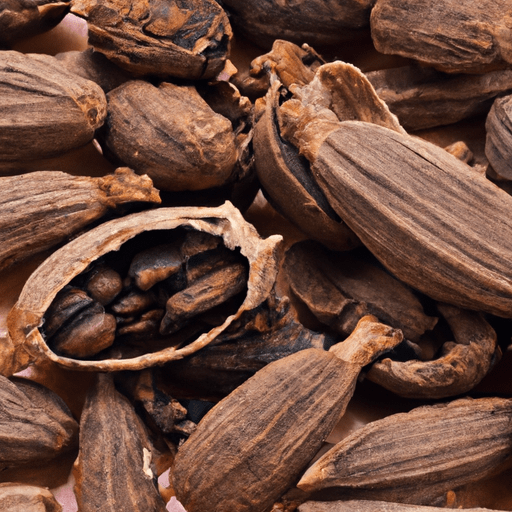Black Cardamom Pods: A Flavorful Spice with a Rich History
If you’re a food enthusiast, you might have come across the aromatic and exotic spice known as black cardamom pods. These little pods may be small in size, but they pack a punch when it comes to flavor and fragrance. In this blog post, we’ll dive into the fascinating world of black cardamom, exploring its taste, common uses in cooking, nutritional value, and uncovering some interesting history and facts along the way.
Taste and Aroma: Smoky, Bold, and Earthy
Black cardamom pods have a distinct flavor profile that sets them apart from their green cardamom counterpart. While green cardamom pods offer a delicate and sweet taste, black cardamom leans towards a smoky, bold, and earthy flavor. Its aroma is rich, aromatic, and often described as a combination of camphor, citrus, and menthol. This unique combination makes black cardamom an undeniably fascinating spice to experiment with in the kitchen.
Common Uses in Cooking: Adding Depth and Complexity
Black cardamom is widely used in various cuisines, including Indian, Chinese, Tibetan, and Vietnamese. Its strong, smoky flavor makes it an excellent addition to savory dishes, where it adds depth and complexity to the overall flavor profile.
In Indian cuisine, black cardamom is a key ingredient in numerous spice blends, such as garam masala and biryani masala. Its robust essence enhances the flavors of meat and vegetable stews, curries, and rice dishes. A pinch of black cardamom can transform a simple dal or soup into a more aromatic and flavorful experience.
In Chinese cuisine, black cardamom is a staple in many braised and slow-cooked dishes. It pairs exceptionally well with rich and fatty meats like pork or duck, infusing them with its smoky essence. A few black cardamom pods thrown into a pot of simmering broth can elevate the flavor to new heights.
Nutritional Value: Essential Minerals and Antioxidants
Aside from providing an intense flavor experience, black cardamom also offers some notable nutritional benefits. These tiny pods are rich in essential minerals like potassium, calcium, and magnesium. They also contain antioxidants, which play a crucial role in promoting overall health and well-being.
Interesting History and Facts: From Ancient Cultures to Modern Kitchens
Black cardamom has a fascinating history that can be traced back centuries. It has been used in traditional medicine systems like Ayurveda and Traditional Chinese Medicine for its digestive and respiratory benefits. In Ayurveda, black cardamom is believed to have a warming effect on the body, aiding in digestion and providing relief from various ailments.
Additionally, black cardamom’s popularity extends beyond the culinary realm. Its aromatic properties have made it a sought-after ingredient in perfumes, soaps, and even breath fresheners.
Did you know that black cardamom is often referred to as “hill cardamom”? This name reflects its natural habitat, as it is predominantly found in the hilly regions of India, China, and Nepal. The harvesting process is labor-intensive, with farmers carefully handpicking the pods when they reach peak maturity.
Conclusion
Black cardamom pods are a versatile and intriguing spice that adds depth and complexity to a wide range of savory dishes. With its smoky and bold flavor, it elevates the taste profile of various cuisines. Whether you’re making a hearty Indian curry or a flavorsome Chinese braised dish, black cardamom is sure to lend its unique essence.
Moreover, black cardamom’s nutritional value and long-standing history in traditional medicine systems make it even more captivating. So, the next time you’re looking to embark on a culinary adventure, don’t forget to include black cardamom pods among your pantry essentials.
Black Cardamom Pods
Origin: Black cardamom pods, also known as Nepal cardamom or brown cardamom, come from the plant species Amomum subulatum. This variety of cardamom is native to the eastern Himalayas and is widely grown in countries such as Nepal, India, Bhutan, and China.
Appearance and Flavor: Black cardamom pods are larger than green cardamom pods and have a distinct smoky flavor. The pods are dark brown and wrinkled, containing small black seeds. The flavor is rich, earthy, and slightly sweet, with notes of resin and camphor.
Common Uses: Black cardamom is commonly used in savory dishes, especially in India, China, and other regions of East Asia. It is a key ingredient in many spice blends, including garam masala in Indian cuisine and Chinese five-spice powder. It is often used in curries, stews, soups, and braised meat dishes to add depth and complexity.
Nutritional Benefits: Black cardamom contains various essential nutrients such as potassium, calcium, magnesium, and phosphorus. It also contains important antioxidants, which help protect against cell damage caused by harmful molecules called free radicals. However, it is typically consumed in small amounts, so its nutritional benefits are relatively modest compared to other ingredients.
Unique Properties: One of the unique properties of black cardamom is its strong aroma, which is released when the pods are crushed or cooked. The smoky scent adds a distinctive flavor to dishes. Additionally, black cardamom is sometimes used for its medicinal properties. It is believed to aid digestion, improve oral health, and have antimicrobial and anti-inflammatory effects.
Historical Significance: Black cardamom has a long history of culinary and medicinal use. It has been mentioned in ancient Indian and Chinese texts, dating back thousands of years. It was highly valued for its flavor and believed to have various health benefits. Today, black cardamom continues to be an important ingredient in many traditional and regional cuisines.




Use the share button below if you liked it.
It makes me smile, when I see it.